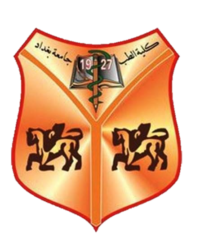Curriculum Description
This course description provides a necessary summary of the most important characteristics of the course and the expected learning outcomes for the student to achieve evidence of whether he made the most of the available learning opportunities. It must be linked to a description of the program.
General Description
| Category | Details |
|---|---|
| Name of Organization: | Baghdad College of Medicine |
| Department: | Internal Medicine, Surgery, Psychiatry (Communications), and Forensic Medicine (Ethics) |
| Module Name: | Early Clinical and Practical Development |
| Course Pattern: | Large group lectures, Small group lectures, Periodic visits to the hospital wards, Team-based learning, and Watching clinical acts. |
| Semester and Year: | 1st Year / Semester 1 and 2 |
| Total Course Hours: | 38 hours |
Goal of the Course
- The student’s understanding of patient communication skills
- Understanding communication skills for communicating with professional colleagues
- Knowing the different specializations of the new doctor
- Knowledge of the principles of medical ethics
- Knowledge of medical responsibility in general
- Learn about the steps for taking a medical case history
- Watch how the patient is examined (some body systems such as the circulatory system, respiratory system, and abdominal examination)
- Identify the basic steps for life-saving first aid
- Knowing the most important medical emergency cases
- Knowing different classifications of laboratory tests
- Knowing different classifications of radiological tests
- Knowing how to deal in general with trauma patients
Outcome of this Module
A. Cognitive and Theoretical Goals:
- Method of taking medical history
- Method of examining the respiratory system, the heart and circulatory system, Abdominal examination method
- Methods of dealing with severe injuries and first aid for serious injuries
- Principles of medical ethics
- General doctor duties
- Patient communication skills
- Understanding communication skills for communicating with professional colleagues
- Communication skills with professional colleagues
- Know the different specializations of the new doctor
- Knowledge of general medical specialties
B. Skills:
- Watch how to take medical history
- Watch the abdominal examination method
- Watch how the heart and circulatory system is examined
- Practice checking vital signs
- Watch acting roles for communication skills
- Watch role-playing of patient examination skills.
Methods of Learning
- Large group lectures.
- Small group lectures
- Periodic visits to the hospital wards
- Watching videos for clinical examination
- Watching videos for communication skills act.
- Sessions about communication skills
- Interacting discussions and videos on the college website
- Team-based learning
Methods of Assessment
- Theoretical exams by multiple choice questions
- Theoretical exams by essays based questions
- Practical exams as pictures
- Interacting exams by INLE website.
C. Values and Sentimental Goals:
- Knowing the general characteristics of a good doctor
- Understanding communication skills for communicating with professional colleagues
- Know the different specializations of the new doctor and their duties
- Knowledge of the principles of medical ethics
- Knows in general how to take history and how to do clinical exam
Methods of Learning
- As mentioned above
Methods of Assessment
- Interactive participation in the designated website through giving lectures and watching educational films
- Taking electronic training exams and participating in the final written exams
D. General and Qualifying Skills (Other Skills Related to Employability and Personal Development):
- Identify the nature of clinical medical sciences and their classifications
- Priorities for dealing with the professional medical environment
- Priorities for linking theoretical and clinical sciences
- Identify the personal characteristics required to practice clinical work
Infrastructure
| Category | Details |
|---|---|
| Week 1: | 5 hours of teaching: how to take medical history, how to examine the cardiorespiratory and abdomen systems and how to deal with the most emergency cases |
| Week 2: | 3 hours of teaching: how to learn communication skills and deal professionally with medical colleagues. |
| Week 3: | 2 hours of teaching: medical ethics |
| Week 4: | 4 hours of teaching: taking vital signs and visiting the hospital |
| Week 5: | 4 hours of learning from communication skills acts |
| Week 6: | 2 hours of hospital visits |
| Week 7: | 10 hours of teaching students about medical specialties and laboratory tests. |
| Week 8: | 20 hours of self-directed hospital visits |
Course Books Required
- Macleod Clinical Examination
Main References (Sources)
- Basic Emergency Care
Recommended Resources
- Electronic references: INLE Iraqi Network Learning Environment

